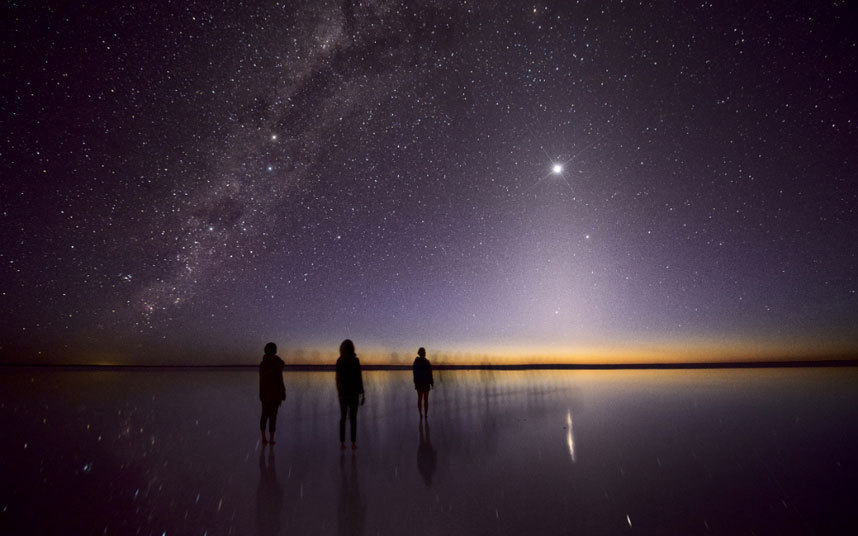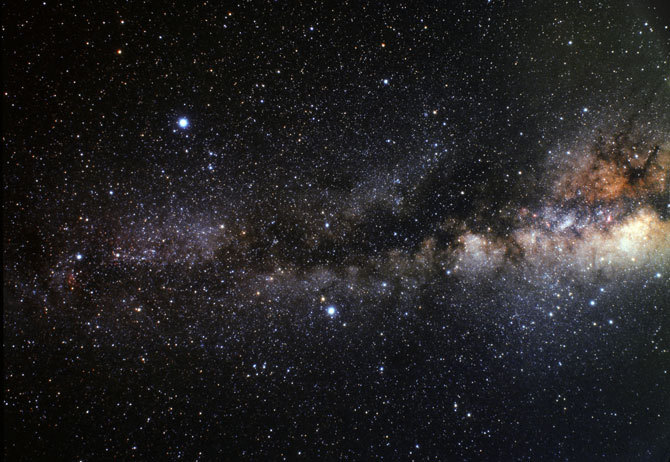Are we alone in the universe?
- Transfer

We still continue to search for any signals from extraterrestrial civilizations. This intense and anxious listening to the ether has already given rise to a lot of speculation. Naturally, the most obvious explanation for the Great Silence is that there is simply no one to “get in touch” with us. It is very unpleasant to allow this, but nevertheless there are sufficient grounds for such a conclusion.
Long before the great physicist Enrico Fermi raised the question “Where is everything?”, People wondered why there were no signals from extraterrestrial civilizations. As Fermi correctly observed, mathematics cannot explain this. Our galaxy is about 13 billion years old, and this is more than enough for hypothetical other civilizations to manage to explore and colonize it. According to one of the worksThis process can take from tens of millions to one billion years. In other words, in theory, we should already have met someone.

However, the complete absence of confirmed contacts led astronomer Michael Hart to suggest that a civilization capable of interstellar flights simply does not exist. However, this “absence” may also be the result of any considerations on their part, including reluctance to explore space, or excessive technological difficulties. Despite the recent discoveries of a number of potentially inhabited exoplanets, as well as our feeling that the Universe is simply designed for life, a number of considerations make us believe that we are unique in every sense of the word.
In the right place at the right time
Astronomer Paul Davis once said : “In order for a planet to be populated, two conditions must be met: the planet must be suitable for this, and at one point, life must arise on it” (thanks, Cap). The existence of life, from the point of view of modern science, depends on the presence of five critical chemical elements: sulfur, phosphorus, oxygen, nitrogen and carbon. These elements are synthesized during thermonuclear reactions in the bowels of stars, and at the end of their life cycle they spread through space. Therefore, over time, the concentration of these substances gradually increases.

But here is the moment: the concentration of these substances in the interstellar space has only relatively recently reached a level at which the appearance of life is possible. That is, the planets around the older stars must be poor in these five elements. Our Sun belongs to rather young stars. So we can be among the first civilizations that appeared, or even the very first.
Stephen Webb disagrees with this point of view. He believes the role of the concentration of chemical elements in our appearance is exaggerated. For example, we do not know what their concentration should be in the star, so that life arises on one of the surrounding planets. Moreover, the proportion of each element varies greatly depending on the class of the star. In other words, we simply have no reason to blame the lack of concentration of chemical elements.
Gamma-ray bursts: evolutionary reset button
Another reason for the lack of signals from other civilizations may be that our galaxy is a source of frequent flashes of gamma radiation (VGI). By frequent is meant about one every few billion years. VGI is one of the most energetically powerful phenomena known to us today. It is believed that they occur during supernova explosions collapsing into black holes, or in collisions of neutron stars. According to statistics, in the entire observable Universe, a gamma-ray burst occurs daily.

A fairly close emission of radiation from a supernova explosion can destroy the biosphere of a planet of the earth type, instantly killing all life on the surface and at a certain depth (underwater and lithoautotrophic ecosystems must survive). Gamma radiation will also provoke chemical reactions, during which up to 90% of the ozone layer will be destroyed, as a result, the planet will be burned out by the harsh ultraviolet radiation of its star.
In 1999, the work was published.in which it was suggested that VGI could be the cause of mass extinction on any inhabited planet at a distance of up to 10,000 light years. For comparison, the diameter of the Milky Way disk is about 100,000 light-years, and its thickness is about 1,000. Thus, a single flash can “sterilize” a significant part of our galaxy.
According to one study , the likelihood of such exposure depends on the location of the planet and time. The closer the planet is to the galactic core, where the density of stars is highest, the greater the probability. According to the constructed model, the probability of falling under a deadly VGI every billion years, in the vicinity of the nucleus, is 95%. At half the distance from the nucleus to the solar system, the probability decreases to 80%.
But there is a nuance. The frequency of VGI in the past was higher, which was due to a lower concentration of heavy elements in the Milky Way. In other galaxies, rich in elements heavier than hydrogen and helium, less VGI is noted. And with the saturation of our galaxy with heavy elements, the frequency of VGI decreased. And this may indicate that 5 billion years ago and earlier the probability of death of extraterrestrial life from VGI was more than high. Some scientists believe that the fate of the Earth did not pass many billions of years ago. Given the high calculated frequency of the occurrence of VGIs in the past, they can be called original reset buttons that "reset" inhabited planets, at best, to the state of the microbial biosphere.
So we can assume that, with a decrease in the frequency of VGI, our galaxy is now in a phase of equilibrium in the transition from a lifeless void to the widespread emergence of extraterrestrial civilizations. So we may not be alone, but with us many more civilizations are actively developing.
The theory is exciting, but still unconvincing for some scientists. For example, astronomer Milan Chirkovich believes that in this case, the frequency of the VGI had to change very sharply, so that we could talk about a noticeable boundary between the phases of the development of life in the Milky Way. He does not deny the very fact of a decrease in the amount of VGI, but this is clearly not enough to explain the Great Silence. Probably, their role is exaggerated, besides, it is completely unknown how much time should pass from “sterilization” to the revival of life up to a fairly advanced civilization.
Our unique Earth
Another possible reason for our loneliness is the Unique Earth Hypothesis . According to her, the conditions for the emergence of a civilization capable of space travel are extremely harsh. This idea arose in 1999 between paleontologist Peter Ward and astronomer Donald Brownlee as a result of a comparison of the latest research in astronomy, biology and paleontology. Scientists have compiled a list of parameters that, in their opinion, make our planet incredibly rare. So rare that we are unlikely to meet another civilization.

The mentioned list looks like this:
- The correct location in the galaxy is the right type . Desert zones exist in galaxies as a result of gamma and X-ray bursts, changes in the concentration of heavy elements and the gravitational influence of stars on planets and planetesimals , which can lead to collisions of celestial bodies.
- Spin at the right distance around the star of the right type . Our planet is located in the so-called Goldilocks zone of our star system, in which the most favorable conditions for the emergence of complex life forms.
- A star system with the right set of planets . Without the gas giants of Jupiter and Saturn, life on Earth could not have arisen. By the way, planets of the "hot Jupiter" type are very common.
- Stable orbit . In binary star systems, the orbits of the planets are unstable, as a result, they periodically leave habitable zones. And binary systems are very common in the Milky Way, they are almost half of the total.
- Earth type planet of the right size . A sufficient land area, a stable atmosphere and a moderate level of gravity are necessary for evolutionary processes to take place.
- Plate tectonics . This process regulates the course of changes in the temperature of the earth's climate. If we had no tectonics, and the average annual temperature would be very unstable.
- Large balancing satellite . Our Moon helps the Earth to maintain a certain angle of inclination of the axis, which is the reason for the change of seasons of the year.
- The trigger mechanism of the evolutionary process of nucleation of a complex life form . The transition from simple unicellular organisms (prokaryotes) to multicellular (eukaryotes) may be one of the most difficult stages of evolution.
- The right time in cosmic evolution . The early periods of the existence of our galaxy and planet were not the best time for the birth of life, given the frequent fall of celestial bodies, off-scale volcanism, an unstable atmosphere and - flashes of gamma radiation.
Admittedly, the list is pretty daunting. But many scientists consider him far-fetched. For example, according to calculations, in our galaxy there should be about 40 billion potentially inhabited planets , life can arise in a rather extreme environment. And some parameters, for example, the role of Jupiter and plate tectonics, are clearly overestimated.
Our unique civilization
It is possible that life, in fact, is very widespread in the universe. The fact of the emergence of civilization in our country is simply unique. Where did we get that using tools, technological progress and creating a complex language are standard steps?

As far as we know now, a complex life form appeared on Earth about two billion years ago, and terrestrial invertebrates - 500 million years ago. Throughout this enormous period of time, not a single species of living creatures on the planet has reached any of the mentioned stages of development. Perhaps the same thing happens throughout the galaxy, and for some reason we have become an exception.
Just for us
There is another hypothesis that explains our loneliness in the Universe, although it already refers to philosophy. It is called the Strong Anthropic Principle . In short, its essence lies in the fact that the Universe is not intended for the existence of life, but only for intelligent life, of man. A very controversial theory that smacks of creationism and rejects a series of obvious evidence to the contrary.

Of course, we are not talking about the fact that the Universe was created by some supernatural forces. Or that we are a product of computer simulation of a certain highly developed civilization. This hypothesis only implies that we see the Universe just like that, because there are conditions here that allow us to be observers only.
Conclusion
There are many other theories that explain the Great Silence. Perhaps the theory of the parallel development of a large number of civilizations is closer to me personally than our complete loneliness. And if we really are in the group of leaders, then that would be great. This would mean that we have many chances to create our own future.
